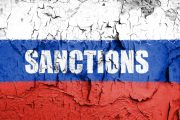Every September 11 the people of Catalonia, an independent region in northeast Spain, celebrate their “national day” — Diada — by taking the day off and parading through the streets of Barcelona. In past years the celebration was a festival used by some citizens as an excuse to get some fresh air, make some noise, and have some fun. This year, nearly one-quarter of the region’s seven million citizens used the celebration as an excuse to swarm into Barcelona to protest Spain’s austerity measures, which have raised unemployment in Catalonia — referred to locally as Catalan — to nearly 25 percent.
The immensity of the crowd far exceeded expectations so that parade routes had to be adjusted and parking places found for the more than 1,000 buses chartered to bring Catalans into the city. Most revelers were waving flags that said, “Catalonia: a new European state.” Said Alfred Bosch, a member of the Catalonian government:
All the flags I can see are the pro-independence flags of Catalonia with the lonely star right in the middle of the triangle.
And everybody is wearing these flags. I have never seen so many pro-independence flags in my all life.
Catalonia is a largely autonomous region of Spain with about 15 percent of the country’s population; it generates about 20 percent of Spain’s gross domestic product. It also pays more in taxes to Madrid than it receives in benefits. The fact that Spain levies taxes on Catalans and then sends only some of the money back to the region is galling, especially to those who relish their “nationalism,” granted in part by the Statute of Autonomy passed in a referendum in June 2006.
That referendum expanded the power of Catalonia’s government — the Generalitat — at the expense of the national government, but was largely ruled unconstitutional by Spain’s Constitutional Court in June last year, rewriting 14 articles and dictating the interpretation of 27 others. In the process it neutered Catalonia’s claim that it was a separate nation (as noted in the preamble), saying the pronouncement was merely “declaratory” but not “legal.” Catalonia, according the court, is to remain a part of Spain, to be ruled by Spain, under the Spanish constitution.
Unrest was heightened when an increase in the Value Added Tax — Spain’s VAT — to 21 percent became effective September 1, with none of the additional taxes going back into Catalonia, one of the richest regions in Spain, but instead being used to support other poorer regions of the country.
It didn’t help any that Spain’s Prime Minister, Mariano Rajoy, criticized the celebration: “Catalonia has serious deficit and employment problems and this is not the moment for messing around or disputes or controversy [over independence].” He added, “This isn’t a moment for big gestures like this. What we need to do is create jobs.”
The king of Spain, Juan Carlos, in a rare public display of unhappiness over the matter, expressed disapproval with leaders on both sides, in an open letter published the day of the celebration:
This is a decisive moment for the future of Europe and Spain. Under these circumstances, the worst thing we can do is to divide our strength, encourage dissensions, follow pipe dreams, and deepen wounds.
Former president of the Generalitat, Jordi Pujol, said that Catalonia no longer “fits” within Spain and needs to move towards independence. He continued:
I haven’t changed; the country has changed. We don’t fit any more inside Spain. I have no arguments left against independence because Spain has made this so….
It is making our country [Catalonia] unviable and we can’t accept the situation any longer.
The current president of Catalonia, Artur Mas, was a reluctant participant initially in the celebration, not willing to commit to the burgeoning movement toward independence. But once he saw the size of the crowds (confirmed by the latest polls showing independence gaining enormously in popularity), he saw the political light, and decided to change the conversation he was planning to have with Rajoy on September 20.
Initially, Mas was going to Madrid, hat in hand, to request a $6.5-billion loan to help pay his government’s bills. But instead, buoyed by the huge turnout, Mas decided to demand the loan as a form of tax refund from previous overpayments Catalonia had been making to the national government. At present, Catalonia contributes about nine percent of its gross domestic product to Madrid every year, but receives far less than that amount back in government services and programs.
That meeting was not propitious. Mas presented his plan to Rajoy: Let Catalonia raise its own taxes and then decide what percent they would send to Madrid, rather than the other way around. Said Mas following the meeting:
It did not go well. Rajoy’s answer was no, that there is no margin, and we can’t knock our head against the wall….
Constitutions may or may not be modified, but they do not subjugate the will of the people….
Catalonia will follow its [own] path. We have no enemies but we will build our own project as a country.
Mas is planning to call for a referendum on the matter before the end of the year, setting in motion events that could spiral out of control. Mas added, “We have to ready ourselves. We have to convince them with arguments. [We must have a] firm willingness, a sufficiently large majority [and] the ability to resist.”
Those were fighting words to members of the Spanish military. An active military officer, Colonel Francisco Alaman, said,
The basis of Catalan nationalism is a hatred of Spain….
Independence for Catalunya? Over my dead body. Spain is not Yugoslavia or Belgium. Even if the lion is sleeping, don’t provoke the lion, because he will show the ferocity proven over centuries….
This is clearly an act of treason as set out in the Spanish penal code. Therefore, if the plenary approved this atrocity, we should immediately arrest both the mayor and the councilors who voted for the proposal.
Emilio Campmany, a history scholar at Strategic Studies Group, a Madrid think-tank, thinks things in Madrid and Barcelona could quickly get out of hand:
I don’t know what the government would do if Catalonians declare [their] unilateral independence. The government has little power to enforce the Constitution, other than the Army.
Carlos Ruiz Miguel, a constitutional scholar and an expert on the issue, was clear: “A unilateral solution for Catalonia would be unconstitutional.” But if the referendum that Mas is planning reflects the verdict already rendered by the 1.5 million citizens protesting Spain’s increasing austerity measures and its perceived lack of respect for its nationhood, then there is going to be pushback from Madrid. Said Ruiz, “I don’t rule out a civil war, or a balkanization of Spain. In Spain, nobody wants to even consider this, but I think it’s tremendously concerning.”




